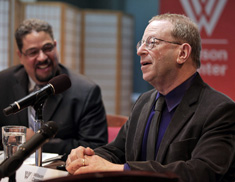-
Steven Philip Kramer on ‘The Other Population Crisis’
May 23, 2014 By Moses Jackson
Ever since Thomas Malthus’ 18th-century treatise linked overpopulation with conflict and poverty, population growth has been a subject of concern and controversy. But does population decline warrant similar attention? According to Steven Philip Kramer, the subject of this week’s podcast and author of The Other Population Crisis: What Governments Can Do About Falling Birth Rates, it does.
Ever since Thomas Malthus’ 18th-century treatise linked overpopulation with conflict and poverty, population growth has been a subject of concern and controversy. But does population decline warrant similar attention? According to Steven Philip Kramer, the subject of this week’s podcast and author of The Other Population Crisis: What Governments Can Do About Falling Birth Rates, it does.
Birth and death rates have been high for most of human history. It was only two to three hundred years ago that some societies began to see significant declines in both fertility and mortality – a process known as the demographic transition. This transition has occurred at different times in different places and is still underway in many countries. While there are potential economic benefits associated with the earlier stages of the transition, Kramer warns that “advanced societies” in the latter stages may have reason to worry.
Declining fertility rates don’t stop at the magical number of 2.1, which guarantees a sustainable populationDeclining total fertility rates – the number of children per woman – “don’t stop at the magical number of 2.1, which guarantees a sustainable population,” says Kramer. Instead, rates in some countries have dropped below replacement levels, raising a unique set of challenges for policymakers. The Other Population Crisis argues falling birth rates could affect national security by straining social welfare systems, hindering innovation and economic growth, altering immigration patterns, and shifting the global balance of power.
Immigration plays a key role by balancing out countries’ different population growth rates – but only to a point. Aging societies can help sustain themselves by welcoming residents from faster-growing parts of the world, explains Kramer, but “if that immigration is on too large a scale, it’s hard to absorb people into society and the political consequences of immigration are really huge – especially, for example, at a time of the Great Recession.” He cites current European politics as an example: “Europeans are reacting to what in fact is very little immigration. They’re reacting by voting for the extreme Right. When elections take place next month, it’s going to be pretty awful.”
Governments face pressures to reverse downward fertility trends, says Kramer – particularly in Europe and Asia, where fertility rates are lowest. But it’s not clear how to do so. “There’s no way you’re going to tell people, ‘We’re going to force you to have children.’ It’s nonsense.” Once people become aware of and start using family planning, there’s no going back, he says.
Kramer draws on the work of Swedish economists Gunnar and Alva Myrdal, who formed the basis of modern thinking on the topic. Their 1934 book Crisis in the Population Question critiqued Malthusian and neo-Malthusian perspectives, advocating for a strong state role in boosting birth rates. Comparing government efforts in Sweden, France, Italy, Japan, and Singapore, Kramer finds the most effective efforts so far have involved social programs that mitigate the financial stresses associated with children and “make it possible for women to reconcile work and family.”
Steven Philip Kramer spoke at the Wilson Center on April 17.
Friday podcasts are also available for download on iTunes.
Topics: aging, Asia, demography, development, economics, Europe, family planning, France, Friday Podcasts, gender, global health, Japan, migration, podcast, population, security
 A Publication of the Stimson Center.
A Publication of the Stimson Center.




